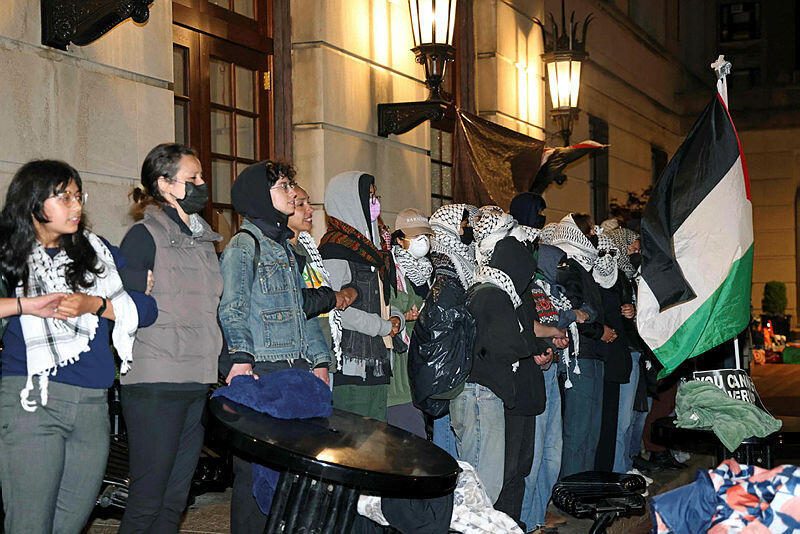Getting your Trinity Audio player ready...
Looking at the current protests in the West, including in Israel, it is impossible to avoid the thought that many of the protesters are simply purblind, devoid of all insight or understanding of the world in which they live. Particularly remarkable is the fact that many women are active participants in protests against Israel’s war to defeat Hamas.
In the United States, they put up signs such as “dykes 4 divest” or “dykes for decolonization,” or alternatively “lesbians for liberation.” Some choose “Paint Ur Nails 4 Palestine.” In Israel, a female-led protest group is calling for Israel not to attack Rafah in order to not threaten the hostages held by Hamas. There have been many other calls, including to “unite women of all sectors with a call to the cabinet to advance a deal to return the hostages."
4 View gallery


Pro-Palestinian protest at Columbia University
(Photo: Spencer Platt / Getty Images North America / AFP)
What is worthy of note in all of this is not female political activism in and of itself, which is a well-established fact of life in free societies. Rather, it is the blind adherence of significant numbers of women to ideas and ideologies that can only bring about destruction, prominently of the very women who espouse them. The roots of this problem are very deep, and it is necessary to review some prominent historical moments to understand just how deep these roots are.
The unlearned lessons of left-wing radicalism
On 18 March 1871, many women in Paris blocked French soldiers from taking control of cannons that had remained in the capital at the end of the Franco-Prussian war, in which France had been decisively defeated. The women were not violent, but others in the crowds on that day were. Barricades were erected, and two generals reconnoitering them, Jacques Clément-Thomas and Claude Lecomte, were lynched. This began a 72-day revolt which would enter history as the Paris Commune. Left-wing extremists seized control of all of Paris, while the government and much of the middle class fled.
Some of the extremists instituted scattered reforms that benefitted residents, including women, such as establishing soup kitchens and free schools. Rather more significantly, the new masters of the capital not only continued but deepened, the armed confrontation with the government and the army.
In April, less than a month after the beginning of the rebellion and more than a century before Hamas, the Commune issued a Decree on Hostages. This ordered the execution of three hostages for every Communard (member of the Commune) killed by the government. This could only serve as the first act of a bloodbath, which did not fail to follow.
The Commune ended in La semaine sanglante (“Bloody Week”), the storming of Paris by the army from May 21 to 28, which involved the killing of between 6,000 and 7.000 Communards. Among them were many women. A Communard, Paul Martine, estimated that about a fifth of those killed were female. Martine was a repulsive character, who would later call the French army captain, and victim of anti-Semitic libel, Alfred Dreyfus, a “poorly naturalized German Jew” who should have been executed. Nonetheless, Martine’s observations of the fate of the women of the Commune were reasonably accurate. Association with political extremism had brought them not greater rights and opportunities, but an ugly death.
This lesson of history was not learned. In 1905, a far more backward and violent society than France, imperial Russia, had lost a different war, the Russo-Japanese War for control of Korea and Manchuria. The absolutist Russian monarchy was discredited, and the first Russian Revolution followed. Women were deeply involved in the revolution, which a historian judged to have been a “turning point in feminist and radical women’s ambitions."
These and other revolutionary energies found their foremost expression in the Moscow uprising of December of that year, led by radical left-wing parties including the Bolsheviks. Unsurprisingly, it ended in another massacre, a victory by the Tsarist Army and the killing of more than 1,000 rebels, including 137 women. A triumph for women’s rights, or human rights more generally, this was not.
As then and still now, Russia leads the world in its determination to learn nothing from the past. On 8 March 1917, International Women’s Day, the women workers of Russia’s Imperial capital, Petrograd, initiated a strike against high prices and hunger. The government and the Tsar, never competent or popular and now burdened down by two and a half years of vicious and unsuccessful war against Germany, could not cope with the protests.
The monarchy shattered like a thin sheet of glass, and then, traveling through Germany on a sealed train, onto the scene emerged Vladimir Lenin, history’s most successful left-wing extremist. Slightly more than a month after the women’s strike which initiated a revolution, he called for nothing less than the abolition of the army, the police and the government bureaucracy, as well as the nationalization of all land in the world’s largest land empire.
Lenin’s plan did not include provisions for women’s rights, or anybody’s rights. By the autumn of 1918, a year after Lenin and the Bolsheviks seized power in the country, the first concentration camps were being set up at monasteries near Moscow. Soon after, the Cheka, the Communist secret police, began setting up Arctic death camps, at first near Archangel, in northwest Russia. Instead of lower prices and more food, the women of Petrograd had won themselves permanent residence in a man-made Dante’s Inferno.
The troubles of the present
More than a century after the Bolshevik revolution, Lenin’s system of government by murder retains a decisive influence over the affairs of all humankind. Russia is no longer Communist, but it is a murderous tyranny, and runs prison camps in which victims are beaten and tortured. Of even greater significance is the fact that China, which has long superseded the Soviet Union as the world’s second most powerful country, is a Communist one-party state. The man who rules it, Xi Jinping, has given himself formal authorization to remain in power indefinitely. Lenin died a century ago, but the system of extreme-left tyranny that he created lives on.
In the United States, the Congressional Progressive Caucus is acknowledged as a far-left political body even by Mara Gay of the New York Times editorial board, yet has numbers and influence far beyond what a radical organization should have in a healthy democracy. It is led by two particularly purblind women, chairwoman Pramila Jayapal of Washington state and deputy chairwoman Ilhan Omar of Minnesota. Both women, and 55 other Representatives, signed a letter stating that “an offensive invasion into Rafah by Israel in the upcoming days is wholly unacceptable.” Quite apart from the fact that the term ‘offensive invasion’ is a ludicrous abuse of the English language, it is necessary to note that the Representatives offer no viable alternative.
The road to nowhere
The imagination of Jayapal and friends does not stretch beyond the stock phrase, “lasting cease-fire that will bring hostages home.” Such a cease-fire would, of course, leave the hostage-takers intact, in Gaza, to plan further terrorism and hostage-takings. If one remembers that Jayapal called Israel “a racist state” in July, even before the current worldwide surge of antisemitism, it is easy to believe that the representatives are not, in fact, in earnest. They could not care less what happens to Israel, and are not going to particularly great lengths to hide this.
It is noteworthy that the women, and also the men, of the Congressional Progressive Caucus are behaving as if the history I recounted above never happened, as if there are no examples as to where blind far-left policies can easily lead. They do not even appear to remember the appalling helicopter evacuation from Saigon, the capital of America’s annihilated ally, South Vietnam, in April 1975. They have closed their eyes equally tightly to the images of Afghans falling to their deaths from an American C-17 on August 16, 2021, less than three years ago. Over the past few decades, America’s record in avoiding either left-wing radicalism, or avoiding betraying American allies, is a very weak one.
Sooner rather than later, the price of failure will have to be paid, and paid in full. Yet, to understand this historical pattern, one has to be aware of it. It appears that both “lesbians for liberation” and the Progressives in Congress, will not understand even the concept of a historical pattern, let alone the specifics of the one most relevant to the present, until it is too late. Therefore, this column is written not for them, but rather for those who do not wish to learn history’s lessons with their own blood and bones. The less America listens to the far left, the better off it will be.
A substantively identical observation applies to Israel. The women who demand, alongside men of similar views, that Israel make any and all concessions in order to return hostages from Gaza are not, or at least not largely, members of the far left. However, their demands share one essential feature with the far left’s attitudes. They have picked a single priority and are unwilling to consider the consequences of following that priority through to the end. Israel, might, or might not, achieve the return of all the hostages if it makes massive concessions to Hamas. At the same time, such concessions will form the basis of more terrorist murders, more hostage-taking, and a wide variety of other atrocities in the future. This is not even a road to nowhere, but rather a road to national crisis, if not national destruction.
The West, including Israel, self-evidently needs women to play a full and equal role in the functioning and success of society. However, playing such a role requires people who have the abilities and the knowledge of soldiers, or airmen, or engineers, or a wide variety of other professions. What a world in crisis does not need is the loud voices of people who are sufficiently blind to not know, and hence to fail to learn from, the awful past. If such voices prevail, that past will not remain confined to the pages of history, but rather it will become an even more awful future.
Dan Zamansky is a British-Israeli independent historian and author of The New World Crisis, a Substack analyzing the problems of today





